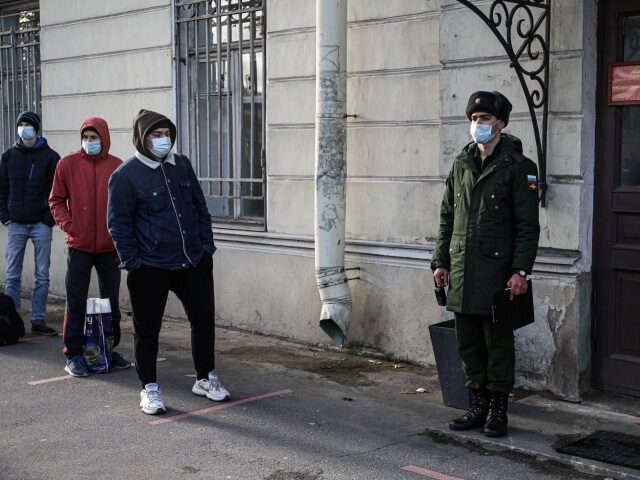Tens of thousands of Russians fleeing Vladimir Putin’s military conscription to fuel the Ukraine invasion have flooded neighboring central Asian countries in the past week, leaving governments such as Kazakhstan and Mongolia with few resources to process the sudden and growing migrant wave.
Putin delivered a national address last week in which he announced a “partial mobilization” of new troops to fuel the eight-year-old war in Ukraine, which began with Putin invading and colonizing Crimea in 2014. Interest in the nearly decade-old war surged in the West in February, when Putin announced a “special operation” to remove Ukrainian President Volodymyr Zelensky, accusing the Ukrainian government of being “Nazis” and Ukraine itself of having “no tradition” of sovereignty.
“I repeat, we are talking specifically about partial mobilization, that is, only citizens who are currently in the reserve will be subject to conscription, and above all those who served in the Armed Forces, have certain military specialties and relevant experience,” Putin promised last week.
Many Russians appear not to believe him. According to Reuters, Kazakhstan has documented as many as 100,000 Russians crossing into the Central Asian nation in the past week. Some estimates suggest hundreds of thousands of Russians have left the country in the past week, counting those fleeing to nations besides Kazakhstan.
Russians do not need visas to enter Kazakhstan, making it an attractive destination for those seeking a quick exit, but it is also not a nation used to major influxes of foreigners, leaving it ill-prepared for a wave of Russian migrants.
Similarly, hours-long lines of vehicles exiting Russia have amassed on the border with Georgia, a nation that has suffered similar Russian invasions to that ongoing in Ukraine in the past two decades. Radio Free Europe/Radio Liberty (RFE/RL) reported on Monday that the line of cars at the border was “stretching for kilometers” and moving slowly, as Georgian border patrol attempt to handle the overwhelming influx.
The Moscow Times, speaking to Russians on the line to enter Georgia, reported that it was at times nine kilometers (about 5.5 miles) long and contained 3,500 cars. As of Monday, the newspaper estimated the line was 16 kilometers (about ten miles) long. Many reportedly ran out of gasoline while waiting to enter, leading them to abandon their cars and try to walk out of the country.
“Many people decided to abandon their cars, they have no water, no fuel, nothing,” one of the men attempting to flee told the Moscow Times, without revealing his identity.
Another man, who successfully entered Georgia, called the situation “total chaos,” noting the lack of gas stations and toilets on the route out of Russia.
Mongolia, on Russia’s southern border, has also seen “thousands” of Russians trying to escape, reportedly leading to full hotels and guesthouses and competition for jobs from the new foreigners.
RFE/RL noted that flights out of Moscow also sold out to other countries such as Turkey, Armenia, Azerbaijan, and Uzbekistan. The Moscow Times estimated that tens of thousands of military-aged men are fleeing or attempting to flee the country to avoid fighting in Ukraine.
“Russia’s borders to the east, south, and west, have been swamped with cars and trucks trying to get out of the country,” the outlet relayed.
The particular pressure on the Georgian border has fueled reports that border patrol agents are questioning young men, in particular, and shaming them for abandoning their nation.
“‘Why are you leaving? Aren’t you a reserve officer? The country is in trouble. When will you return?’ But [the Russian border guards] didn’t create any problems. They let us go,” one man said he was asked before being allowed in in a message on the mobile app Telegram.
One Telegram user estimated that one out of every 20 cars was blocked from entering Georgia.
The president of Kazakhstan, Kassym-Jomart Tokayev, told reporters on Tuesday that he is planning to reach out to Russian authorities to discuss the migrant surge, but appeared more sympathetic to the migrants than reports have portrayed Georgian authorities as being. Tokayev insisted, however, that the wave of Russians entering the country was not a “crisis.”
“We do not have any crisis. Our government must do its work. The incoming people will be provided with help, but not special benefits. All necessary procedures will be held in accordance with the law,” the president said. “We will hold talks with Russia and resolve this issue with taking our people’s interests into account.”
Tokayev notably called the situation a “political and humanitarian issue” and described the Russians as fleeing from “a hopeless situation,” a sign that Kazakhstan disapproves of Putin’s conscription.
“We must take care of them and ensure their safety,” Tokayev insisted.
The migrant wave has reportedly begun to cause unrest in some affected countries. RFE/RL reported that, given that many Russians are entering Kazakhstan with more funds than locals, “landlords have begun to evict Kazakh tenants in order to rent homes to Russians at much higher prices.” In Mongolia, young Russian men are seeking jobs in construction and unskilled labor, now creating competition that Mongolian men did not previously have to contend with. Hotels and other short-term locations to stay are full.
Russia has yet to act to prevent Russians from leaving the country, but some reports suggest that it may begin screening for individuals eligible to fight in Ukraine trying to escape. The Moscow Times, citing the Russian news agency Tass, reported on Monday that Russia will begin to issue summons on the Georgian border to military reservists appearing there. The Russian Defense Ministry has nonetheless insisted it would not yet ask the countries affected by the migrants to extradite them back to their home nation.

COMMENTS
Please let us know if you're having issues with commenting.